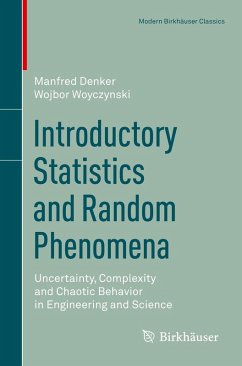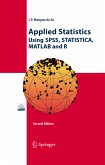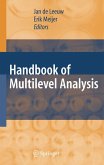Introductory Statistics and Random Phenomena integrates traditional statistical data analysis with new computational experimentation capabilities and concepts of algorithmic complexity and chaotic behavior in nonlinear dynamic systems. This was the first advanced text/reference to bring together such a comprehensive variety of tools for the study of random phenomena occurring in engineering and the natural, life, and social sciences.
The crucial computer experiments are conducted using the readily available computer program Mathematica® Uncertain Virtual Worlds(TM) software packages which optimize and facilitate the simulation environment. Brief tutorials are included that explain how to use theMathematica® programs for effective simulation and computer experiments. Large and original real-life data sets are introduced and analyzed as a model for independent study.
This is an excellent classroom tool and self-study guide. The material is presented in a clear and accessible style providing numerous exercises and bibliographical notes suggesting further reading.
Topics and Features
- Comprehensive and integrated treatment of uncertainty arising in engineering and scientific phenomena - algorithmic complexity, statistical independence, and nonlinear chaotic behavior
- Extensive exercise sets, examples, and Mathematica® computer experiments that reinforce concepts and algorithmic methods
- Thorough presentation of methods of data compression and representation
- Algorithmic approach to model selection and design of experiments
- Large data sets and 13 Mathematica®-based Uncertain Virtual Worlds(TM) programs and code
This text is an excellent resource for all applied statisticians, engineers, and scientists who need to use modern statistical analysis methods to investigate and model their data. The present, softcover reprint is designed to make this classic textbook available to a wider audience.
Reviews
Highly data-oriented, with an unusually large collection of real-life examples taken from industry and various scientific disciplines... The book departs from the standard fare, by [also] including detailed coverage of such contemporary topics as chaotic dynamical systems, the nature of randomness, computability and Kolmogorov complexity, encryption, ergodicity, entropy, and even fractals.
-Short Book Reviews, International Statistical Institute
I find [this book] to be an excellent textbook, and I strongly recommend it as an introductory technical statistics course to engineering and science students who have had a basic programming course in computer science. I expect it to become a classic.
<-Mathematical ReviewsDieser Download kann aus rechtlichen Gründen nur mit Rechnungsadresse in A, B, BG, CY, CZ, D, DK, EW, E, FIN, F, GR, HR, H, IRL, I, LT, L, LR, M, NL, PL, P, R, S, SLO, SK ausgeliefert werden.
"This is an innovative book... Well-constructed computer exercises with a bundled easily usable software package 'Mathematica® Uncertain Virtual Worlds®'... The bibliographical notes that accompany each chapter...are clearly written with a keen eye toward encouraging students to enrich their understanding by pursuing additional reading...A lucidly written text and many well-designed computer experiments that enable students to simulate the whole process of some dynamic systems." -Technometrics
"Highly data-oriented, with an unusually large collection of real-life examples taken from industry and various scientific disciplines... The book departs from the standard fare, by [also] including detailed coverage of such contemporary topics as chaotic dynamical systems, the nature of randomness, computability and Kolmogorov complexity, encryption, ergodicity, entropy, and even fractals." -Short Book Reviews (Int'l Statistical Institute)
"The novelty of the book is the integration of ideas about statistics of random phenomena stemming from algorithmic computational complexity, classical probability theory and chaotic behavior in nonlinear systems, and the broad use of Mathematica in the exposition. Moreover, the examples of statistical problems used arise in real-life industrial and scientific lab situations and have been collected from the engineering and scientific literature, or through direct interaction with practicing engineers and scientists. The authors' goal is to give engineering and science students a forward-looking alternative to the usual introductory statistics courses...In summary, I find Introductory statistics and random phenomena an excellent textbook, and I strongly recommend it as an introductory technical statistics course to engineering and science students who have had a basic programming course in computer science. I expect it to becomea classic." -Mathematical Reviews
"Highly data-oriented, with an unusually large collection of real-life examples taken from industry and various scientific disciplines... The book departs from the standard fare, by [also] including detailed coverage of such contemporary topics as chaotic dynamical systems, the nature of randomness, computability and Kolmogorov complexity, encryption, ergodicity, entropy, and even fractals." -Short Book Reviews (Int'l Statistical Institute)
"The novelty of the book is the integration of ideas about statistics of random phenomena stemming from algorithmic computational complexity, classical probability theory and chaotic behavior in nonlinear systems, and the broad use of Mathematica in the exposition. Moreover, the examples of statistical problems used arise in real-life industrial and scientific lab situations and have been collected from the engineering and scientific literature, or through direct interaction with practicing engineers and scientists. The authors' goal is to give engineering and science students a forward-looking alternative to the usual introductory statistics courses...In summary, I find Introductory statistics and random phenomena an excellent textbook, and I strongly recommend it as an introductory technical statistics course to engineering and science students who have had a basic programming course in computer science. I expect it to becomea classic." -Mathematical Reviews




